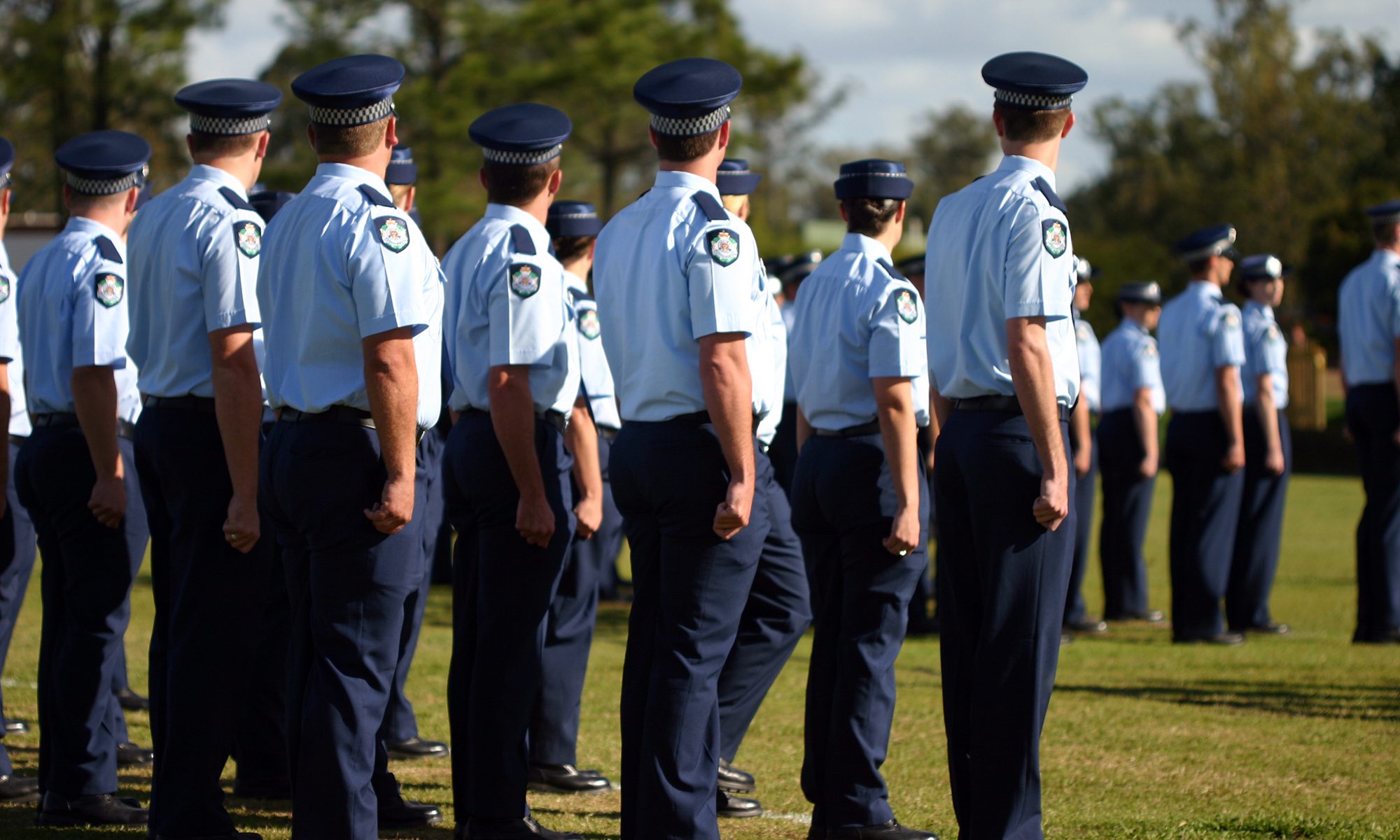7 Steps to Becoming a Police Officer
After The Military
Table of Contents
3 Reasons Why Police Departments Like Hiring Veterans
Trainable
Veterans know how to follow orders and complete specified tasks to knowing when to take initiative and bear responsibility.
Leadership
Thanks to a wide range of roles and responsibilities learned in the military, veterans oftentimes are great leaders and good role models.
Teamwork
similar to policing, service members are usually team players, and know how to rely on each other to get the job done.
Watch How to Join a Police Department
Requirements & Qualifications to Become a Cop
- You must be at least 21 years of age
- You must be a United States citizen
- You must have a high school diploma or GED
- Must not have been discharged from military service under less than honorable conditions
- Must pass all phases of the hiring process
- Must have a valid driver's license
- Must pass the Medical Exam and Drug Screen
- Must not have any felony convictions
- Must not have any domestic violence convictions
7 Steps to Becoming a Police Officer After The Military
Authors: PoliceLink & Military.com
#1 Choosing the Right Law Enforcement Career
A common question received at PoliceLink relates to what a service member can do in order to best align their skills with those needed to succeed as a civilian law enforcement officer (LEO). In this section, we’ll help you figure out which areas of law enforcement your skills best suit you for. For active duty service members, this may help you determine whether or not you need to change your specialty in order to prepare you for the field you strive to be a part of.
The Military.com Skills Translator is a free tool that will translate your MOS, Rate, AFSC, or designator into their civilian counter parts. For example, a Navy MA 2008 has the skills needed to fill a Corrections Officer position, while a Marine Corps MP 5811 would find a good fit as a police officer or deputy sheriff.
Using the Military.com Skills Translator will provide you with a wealth of information on career fields, different options for your current skills, or can help you figure out what specialty to change to, should have that option.
Police Officer / Deputy Sheriff
Police officers and deputy sheriffs serve as every community’s front line defense against criminals. They conduct routine patrols, respond to calls for service, appear at community events, and conduct community policing initiatives.
When initially hired as a police officer or deputy, you will almost certainly be assigned patrol duties. Once you serve your time as a rookie, you’ll be given opportunities for advancement and promotion into a variety of specialty areas, such as K9, SWAT, bike patrol, motor squad, etc. Some of these units, such as K9 or motor squad, may be full time units, while others may be on call or as needed. In either case, you will be required to receive specialized training, which is highly sought after in order to advance your career.
The average starting salary for an entry level police officer is roughly $48,000. Officers with degrees or military service generally start at a slightly higher salary and are given the opportunity to advance more quickly.
Corrections Officer
Corrections officers perform a critically important role in the law enforcement world: the custody and supervision of today’s offenders. With today’s inmate population growing faster than ever, there is a never ending shortage in the need for corrections officers. It is estimated that there are about 500,000 correctional officers supervising almost 2.5 million inmates in local, state and federal jails at any given time in America.
All correctional facilities require at least a high school degree. However, many agencies – especially state and federal agencies – require at least a college degree or a mix of college credits, prior counseling experience, or prior military service.
The average income for an entry level corrections officer in America is about $36,000. Officers with degrees or prior military supervisory service generally advance quickly through the ranks to a higher paying supervisory position.
Special Agent / Federal Agent
There are hundreds of state and federal agencies that employ special agents. Agencies as obscure as the Virginia Lottery Commission or as famous as the Federal Bureau of Investigation all hire the most highly qualified candidates. Successful candidates often have advanced degrees in specialties such as accounting, computer sciences, foreign languages, or chemistry, or engineering.
The most qualified special agent candidates also have prior military or law enforcement experience. The average entry level salary for special agents is above $50,000 per year, with plenty of opportunities to advance to special agent in charge or higher.
#2 Transition Made Easy: Timeline and Checklist
One Year Before Separation
• Check out the Reserve and Guard programs – you could earn pay, benefits, and a pension.
• Begin researching your relocation, benefits, job boards, etc.
• Contact your Education or Transition Office to take a Job Skills and Interest assessment, to determine the best civilian career field.
• Check out the Career Fields that interest you.
• Start attending Job Fairs to begin networking.
• Meet thousands of cops who are former vets on PoliceLink.
• Contact your TAP or personnel division office for information about your services terminal leave and precede time policies. Note: You can actually check out from your present unit, move, and begin working a new job months before you are officially separated from the service.
• Plan your terminal leave and proceed time to determine how soon you can begin working your new job.
• Join a professional organization or union in your career field.
• Actively pursue using your Military Education and Training Benefits to improve your qualifications.
• Start using Military.com’s Resume Builder to develop your resume.
• Contact your medical department to begin scheduling any required physicals.
Eight Months Before Separation
• Contact the law enforcement agencies that interest you. Fill out an Interest Card or equivalent. Let the recruiters know you will be seeking employment with them. Get the name and number of the personnel with whom you spoke.
1 Year Countdown
1 yr – Meet former vets on PoliceLink
8 mo – Pick up applications from departments you want to work for
6 mo – Submit applications
5 mo – Make sure you have budgeted and saved money for the transition
4 mo – Schedule your separation physical exam
3 mo – Arrange shipments of your HHG
2 mo – Verify your DD214 is corrected and complete
1 mo – Spend last 30 days settling into your new life
• Pickup applications and start filling them out. This will take several weeks, since there will be a lot of personal information and history you will need to track down.
• Use the military.com Federal Resume Handbook if you’re planning to apply for a federal job.
Six Months Before Separation
• Contact your Transition Assistance Office for help in beginning the pre-separation process, developing your personal transition plan, filling out the required forms.
• Begin making copies of your medical records – make sure you get the copies certified by your medical office or they will be considered worthless.
• Begin posting your e-resume but be make sure to include your actual date of availability.
• Attend a TAP seminar.
• Continue to attend any job-fairs, seminars and training available in your area.
• Submit your applications to the law enforcement agencies you want to apply to.
Five Months Before Separation
• Actively research the job market in your chosen geographic area, and career field.
• Make sure you have budgeted and saved enough to get you through your transition.
• Continue to attend job fairs, career fairs, and any TAP related events. Four Months Before Separation
• Make sure your Education and Training Records (DD2586) is in order.
• Contact your personnel office for assistance with planning your relocation and visit Military.com for your free Moving Kit and up to date relocation information.
• Schedule your Separation Physical Exam
• Continue to build your network on PoliceLink.
• Contact your military housing office to begin planning your check-out.
Three Months Before Separation
• If you haven’t already, start putting together your civilian wardrobe.
• Contact your Personnel Office to start the paperwork for your separation and arranging the shipment of your household goods (HHG).
• Contact your base Personal Property Office to schedule an appointment for counseling on your shipment of HHG.
• Work closely with your TAP office and continue to attend any available TAP events.
• Contact a Vet Employment Rep in the area you will be living.
• (Retirees Only – Required by Law) Complete your Survivor Benefit Plan (SBP) paperwork.
Two Months Before Separation
• Continue to actively hunt for job opportunities and send out resumes.
• Verify your DD214. Your DD 214 is the most important document you will ever take away from the military. Any inaccuracies that go un-fixed may cause you to be ineligible for VA benefits, or worse.
• Make sure your DD214 reflects all awards, citations, and MOS information.
• Apply for permissive orders to go house hunting in the area you are planning to move to.
• Make sure your departure physical is correct.
One Month Before Separation
• If you have completed this checklist you should be able to spend the last 30 days taking care of your packing, checking out and getting settled into your new life.
• Remember: Within the first 120 days after separation many of your benefits (Life Insurance, Health Insurance, etc.) expire, so you should check out your options for replacing these benefits ASAP.
#3 Picking a Police Department
There are many things to take into consideration when picking a department. Things like the type of law enforcement agency, proximity to where you want to live, or starting pay all are important factors. One of the biggest mistakes made by candidates is having their heart set on one specific department and refusing to apply anywhere else. As anyone with experience will tell you, this is a big no-no.
Once you decide what type of agency you want to work for – for example, a county sheriff’s office, big city police department, or a state police department – figure out WHERE you want to work. Maybe you want to stay near your last duty station, or maybe you want to return to your hometown. Try to narrow it down sooner rather than later, because you want to be sure you’re available in the area for interviews, exams, polygraphs, etc.
Now that you’ve decided where you want to work, here are a few pointers for narrowing in on the specific departments.
Zeroing in on a department
It is important to do your research on the area’s law enforcement agencies. If you’re like most people, you will have decided on a metropolitan area. Areas like southern California or the New York City metro area will offer literally hundreds of police departments and sheriff’s offices to choose from. Other areas, such as Washington, DC, or St. Louis, for example, have dozens of area agencies that are hiring. When applying for a law enforcement position, it is a good idea to apply at as many agencies as are hiring in the area.
Agency reviews
Learn what agencies are in the area and start learning about them. Searchable by region, PoliceLink Agency Reviews are a great source of inside information about departments throughout the country. Visit individual department websites and learn what sort of units they have, how big the departments are, their chain of command, and anything else you can about the agency. Of special important should be their recruitment section. This may indicate if they’re hiring, or when their next entrance exam may be. It should also list qualifications for the positions, such as maximum age, educational requirements, past military service, etc.
Networking
The best way to learn about any department is by getting the inside scoop from people already serving in it. That may seem a `bit tedious when you’re serving your country half a world away. Fortunately, both PoliceLink and Military.com have the two largest communities of law enforcement and military personnel in the world.
PoliceLink’s groups and discussion forums are designed to bridge the gap between aspiring and active LEOs throughout the country – and throughout the world in the case or military service members. You can get connected with officers from a specific department, region, military affiliation, law enforcement specialty, and much more. There are even recruiting officers who offer sound advice for prospective candidates.
Military.com’s Veteran Career Network has countless members, many of whom are currently serving in law enforcement and have volunteered to serve as career advisors. Reaching out to these members can go a long way to help you get the answers you have and to build a good rapport with someone in a department you want to serve in.
And remember – in a few years from you’ll have the opportunity to help the next wave of transitioning veterans, so be sure you help out when the time is right.
Researching the departments
The next step after picking the departments you want to apply to is meeting the recruiters. We’ll go over that in detail in the next chapter, but before we do, there’s one more important task to be done so you’re prepared.
Using what you learned in the preceding steps will already set you apart from other candidates. But there’s still more to learn. Before you even meet with a recruiter you will want to know everything you can about the department – size of the force, number of residents they protect, the chief’s name, the mayor’s name, any special jurisdiction they have, how long the department has been around, etc. Learn all that you can for each department you intend to meet with.
Often times, some or all of this information can be found on the department’s website or on the government agency’s website. You can also use your networking contacts to learn little tidbits of information other candidates may never have the opportunity to learn.
#4 Meeting a Recruiter
Wear a suit
Always wear a suit or coat and tie. Wearing business attire shows that you hold yourself to the highest standards, and that is what a recruiter is looking for in a candidate. Many prospective recruits make the mistake of showing up in their every day street clothes.
This does not go unnoticed and there is a high probability that your resume or application will end up on the bottom of the pile. If, for some reason, it is absolutely not possible for you to wear a suit then make sure you tell the recruiter before hand so they know.
Speak professionally
Just as you need dress professionally, you need to speak professionally. Don’t act around the recruiter how you would act around your friends or family. Don’t use slang or other profane language and stay away from making jokes. Even the most innocent jokes be offensive to some people.
Ask questions
Be prepared with a list of questions you have for the recruiter. This is your chance to get clarifications to questions you might have about the academy, your time with an FTO, or about general career advancement. Make sure your questions are relevant and aren’t already answered through general literature.
Don’t try to impress the recruiter with your knowledge (or perceived knowledge) of law enforcement. You’re there to get information from the recruiter, not to give it. Even if the recruiter is telling you something you already know, listen intently and be thankful for the information.
Listen and be courteous
When you meet with a recruiter there will be opportunities for you to get your questions answered. Don’t interrupt or cause disruptions if the recruiter is speaking to someone else or isn’t answering your question as quick as you would like. Be courteous and wait for the appropriate time to interject or clarify your question.
Don’t use military jargon
Even though you are transitioning to a military-friendly environment, remember that not all cops are former military and may not understand or appreciate certain language, words, or attitudes. Always act and speak professionally in front of a recruiter. Even if you find out that the recruiter served in the same unit as you at some point, be professional and don’t accidentally start talking like you’re boot camp.
Be early
Do not be late, especially if you have a one-on-one meeting with the recruiter. Plan to arrive at least 15 minutes early. Just drive around the block a few times if you arrive too early, but don’t expect the recruiter to wait around for you if you show up late. And remember, cops are expected to be on call for roll call for every shift, with no excuses. Showing up late for your first meeting with a member of the department is not the way to get off on good start.
Expect tough questions
Why do you want to be a cop? Do you have anything questionable in your past? When was the last time you used drugs? Those are just a few of the questions that you will be asked during your application process. Be prepared to answer them quickly and honestly even as early as your first meeting with the recruiter. Always remember that if you lie, they will find out and your career will be over before it even starts.
Be prepared to state your goals
You should list out your career goals before you even make a meeting with the recruiter. Be true to yourself and be honest, but don’t be stupid. Instead of saying you want the job only to get into law enforcement you will move to another agency at the first opportunity isn’t a good thing to say. Instead, consider saying you are eager to have the experiences only a street cop can get and that you aspire to someday be a federal agent.
Remember you are signing up to be a police officer
The authorities and responsibilities bestowed on a police are very serious. You must always be professional and courteous to everyone you encounter. Your attitude and demeanor must convey the embodiment of these principles to the recruiter.
#5 Police Exams
There are many companies out there that offer study guides for law enforcement entrance exams. If the recruiter you spoke to recommended one over another – buy it and study it from cover to cover. The exam is often times your key into the rest of the application process. Do good, because if you’re applying with multiple agencies, you can expect that your results will be shared amongst the recruiters.
Study guides
There are career advice guides for just about every industry out there. Law enforcement is a unique industry where applicants need to pass a series of exams; generally a written test, an interview, and a polygraph exam.
Most libraries have law enforcement related study guides available, however, it highly recommended that you purchase your own so that you can make notes in the book and take the practice exams without worry of defacing the library books. Below are links to many of the highly recommended study guides.
Go on a ride along
Many people want to become cops because of what they see on TV or in the movies. However, the typical cop does not spend his time shooting up the downtown streets. Most agencies have ride along programs available to citizens and recruits. It is a good idea for you to take advantage of this opportunity to spend a shift riding with an officer. This is the closest you will come to experiencing what a typical shift is like short of being an officer yourself.
For more information about conducting a ride along contact the agencies you are considering applying to or contact your local law enforcement agency.
#6 Background Check
The background check may be the most invasive experience you’ve ever had in your life. Everything about you will be checked out. Your character, your finances, your driving and criminal records, to name just a few. The information here will help you prepare for the background investigation:
• Be honest and upfront
• Tell your friends and family
• The polygraph
• Security clearance basics
Be honest and upfront
The most important thing about your background check is that it be complete, accurate, and truthful. Intentionally leaving anything out or falsifying information is the kiss of death. The investigators conducting your investigation will find out. They are less concerned with some minor violation of the law then they are with the fact that you would tell them about it. They are expecting truthfulness. It is better that you tell them of a 10 year old misdemeanor arrest then them having to find out some other way.
Tell your friends and family
You probably noticed a place on your application packet to list friends, family and former neighbors. There’s a reason for that. The background investigators will be making contact with your references. And from your references people they will get the names of “secondary” references, people you didn’t list but who they find on their own.
Before your investigation begins be sure to let you for friends, family, former neighbors, and former coworkers that you are applying for a law enforcement position and that they may be contacted by an investigator. Let them know that they shouldn’t be surprised and that they should feel free to honestly answer any questions the investigators ask.
Background check and polygraph
Just about every agency out there administers a polygraph exam. They do this to verify the information you provided in the application packet is truthful and to address topics covered in the background investigation.
There is nothing fun about the polygraph. Everyone is nervous when they take one. As long as you were truthful during your interviews, in your application, and on your background investigation, you shouldn’t have anything to be worried about.
But just for the fun of it, here are the types of questions you might be asked:
• Have you ever stolen anything?
• Have you ever lied to your boss?
• Have you ever looked at child porn?
Security clearance basics
If you are applying for a federal law enforcement position there is a good chance you will also need to qualify for a federal security clearance of secret, top secret, or even higher. Having served in the military, chances are you are familiar with this process, so this should only serve as a reminder.
The security clearance background investigations will be similar to the background investigation you have already gone through. Depending on the clearance level, however, the investigation may go further back into your past (ie, 10 years into your past instead of 5 years). Just like your background investigation, answer all of these questions truthfully and fully.
#7 Common Hurdles By Veterans
If you’re like most military service members, you’ve spent your entire working career in the military. You know how it works and you know how to work with it. Getting out and entering the civilian world can be daunting to think about. You’ll hit your fair share of hurdles along the way. As long as you expect them, they should be easier to overcome.
We asked a few veterans who are now sworn law enforcement officers some of the things they ran into during their transition into civilian law enforcement. We hope these tips help better prepare you for your own journey into the most rewarding career of your life.
Starting at the bottom
After moving your way up through the ranks, be prepared to start at the bottom all over again. This applies to officers and enlisted service members alike. You will be considered the “rookie” for the next few years and will have to earn the respect of the LEOs you are now working with. And be sure you can take a practical joke.
Post Traumatic Stress Disorder
Post Traumatic Stress Disorder (PTSD) is one of those things that people often don’t want to talk about. If you served in a combat zone or otherwise feel that you could be suffering from PTSD, seek help. Don’t be ashamed about it. It can be overcome, but not if you refuse to do anything about it.
Military.com has pulled together a lot of great resources about combat zone PTSD that can help you find the treatment you may need.
Being considered overly aggressive
Many agencies are paying closer attention to personnel who are returning to active law enforcement service after being called to active duty and deployed to combat zones. The actual number of cases of returning veterans acting aggressively are few and far between, but because of the liability involved, agencies don’t wish to take chances. You may be subjected to additional interviews or monitoring if you’ve served in a combat zone. Don’t take it personally, and do what you can to alleviate any concerns.














